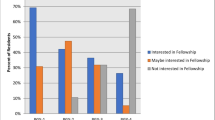Abstract
Objective
A survey of recently certified psychiatrists was conducted to obtain their feedback about the contribution of the primary care and neurology components of residency training to their professional development and to their current needs as practitioners.
Methods
A 22-item survey was developed based on issues discussed at a forum on residency competence requirements and administered electronically to four cohorts of recently certified psychiatrists.
Results
The response rate was 17% (1049/6083). Overall, the respondents described both their primary care and neurology experiences as helping them accomplish several goals for their professional development. The majority were satisfied with their primary care training and felt well-prepared to enter practice. The most common suggestions for improving the primary care component were better integration with psychiatry and providing longitudinal experiences and more outpatient experience. They were somewhat less satisfied with their neurology training, and only about half felt well-prepared for the neurologic aspects of psychiatry practice. The most common suggestions for improving neurology training were to provide more time in neurology with experiences that were more relevant to psychiatry such as outpatient and consultation experiences. Some also thought longitudinal experiences would be useful.
Conclusions
These psychiatrists were generally satisfied with the primary care and neurology components of residency training and felt that they had contributed to their professional development. Their suggestions for improvement contribute to the rich discussion among training directors and other psychiatry educators about these components of residency training.
Similar content being viewed by others
References
Accreditation Council for Graduate Medical Education. ACGME program requirements for graduate medical education in psychiatry. Available at: http://www.acgme.org/Portals/0/PFAssets/ProgramRequirements/400_psychiatry_2017-07-01.pdf?ver=2017-05-25-083803-023. Accessed 28 November 2017.
Accreditation Council for Graduate Medical Education and American Board of Psychiatry and Neurology. The psychiatry milestone project. Available at: http://www.acgme.org/Portals/0/PDFs/Milestones/PsychiatryMilestones.pdf?ver=2015-11-06-120520-753. Accessed 28 November 2017.
Gutmann L, Adams HP, Jr., O’Shea S, Juul D, Faulkner LR. Feedback from early career neurologists and child neurologists about the primary care and psychiatry components of residency training. Poster presented at the annual meeting of the American Academy of Neurology. Boston, MA, April 23, 2017.
American Board of Psychiatry and Neurology. Pass rates for first-time takers. Available at: ABPN-Pass-Rates-5-Year-Summary.pdf. Accessed 2017.
Sowers W, Arbuckle M, Shoyinka S. Recommendations for primary care provided by psychiatrists. Community Ment Health J. 2016;52:379–86.
Annamalia A, Rohrbaugh RM, Sernyak MJ. Status of general medicine training and education in psychiatry residency. Acad Psychiatry. 2014;38:473–5.
Annamalia A, Rohrbaugh RM, Sernyak MJ. General medicine training in psychiatry residency. Acad Psychiatry. 2015;39:437–41.
Joseph R, Kester R, O’Brien C, Huang H. The evolving practice of psychiatry in the era of integrated care. Psychosomatics. 2017;58:466–73.
Wright MT. Training psychiatrists in nonpsychiatric medicine: what do our patients and our profession need? Acad Psychiatry. 2009;33:181–6.
Raney LE. Integrating primary care and behavioral health: the role of the psychiatrist in the collaborative care model. Am J Psychiatry. 2015;172:721–8.
Vanderlip ER, Roney LE, Druss BG. A framework for extending psychiatrists’ roles in treating general health conditions. Am J Psychiatry. 2016;173:658–63.
Wehr LM, Vanderlip ER, Gibbons PH, Fiedorowicz JG. Psychiatry residents’ perceptions and reported practices in providing primary care. J Grad Med Educ. 2017;9:237–40.
Selwa LM, Hales DJ, Kanner AM. What should psychiatry residents be taught about neurology? A survey of psychiatry residency directors. Neurologist. 2006;12:268–70.
Reardon CL, Walaszek A. Neurology didactic curricula for psychiatry residents: a review of the literature and a survey of program directors. Acad Psychiatry. 2012;36:110–3.
Rakofsky JJ, Cotes RO, McDonald WM, Schwartz AC, Rapaport MH. Beyond the psychiatric horizon: preparing residents for the twenty-first century. Acad Psychiatry. 2017;41:125–31.
Coverdale J, Balon R, Beresin EV, Louie AK, Tait GR, Goldsmith M, et al. Teaching clinical neuroscience to psychiatry residents: model curricula. Acad Psychiatry. 2014;38:111–5.
Benjamin S, Travis MJ, Cooper JJ, Dickey CC, Reardon CL. Neuropsychiatry and neuroscience education of psychiatry trainees: attitudes and barriers. Acad Psychiatry. 2014;38:135–40.
Bennett JI, Handa K, Mahajan A, Deotale P. Psychiatry chief resident opinions toward basic and clinical neuroscience training and practice. Acad Psychiatry. 2014;38:141–4.
Fung LK, Akil M, Widge A, Roberts LW, Etkin A. Attitudes toward neuroscience education in psychiatry: a national multi-stakeholder survey. Acad Psychiatry. 2015;39:139–46.
Roffman JL, Simon AB, Prasad KM, Truman CJ, Morrison J, Ernst CL. Neuroscience in psychiatry training: how much do residents need to know? Am J Psychiatry. 2006;163:919–26.
Taylor JJ, Williams NR, George MS. Beyond neural cubism: promoting a multidimensional view of brain disorders by enhancing the integration of neurology and psychiatry in education. Acad Med. 2015;90:581–6.
Williams NR, Taylor JJ, Snipes JM, Short EB, Kantor EM, George MS. Interventional psychiatry: how should psychiatric educators incorporate neuromodulation into training? Acad Psychiatry. 2014;38:168–76.
Author information
Authors and Affiliations
Corresponding author
Ethics declarations
The study was approved by the University of Iowa Institutional Review Board. Consent was obtained from all participants.
Conflict of Interest
On behalf of all authors, the corresponding author states that there is no conflict of interest.
Rights and permissions
About this article
Cite this article
Juul, D., Lyness, J.M., Thomas, C.R. et al. Primary Care and Neurology in Psychiatry Residency Training: a Survey of Early Career Psychiatrists. Acad Psychiatry 43, 51–55 (2019). https://doi.org/10.1007/s40596-018-0922-6
Received:
Accepted:
Published:
Issue Date:
DOI: https://doi.org/10.1007/s40596-018-0922-6



